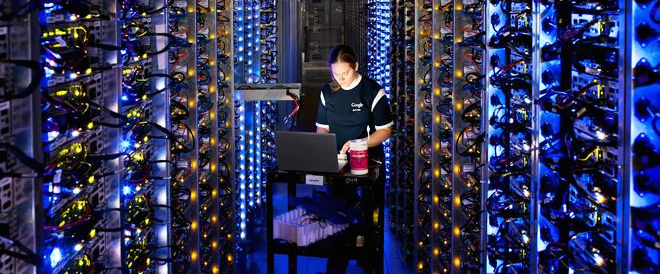Let's do a thought experiment. Let's imagine your house connected up to the internet. It's called the "Internet of Things" or #IoT for those on Twitter, and it's a new way of collecting data about you, while promising to make your life more convenient. But we've heard that line before…
There is already too much of your data up for grabs "out there" on the net. Google, Foursquare, FB, Yahoo: they all know where you are almost all the time and what you buy. Your web searches produce a data trail that is analyzed to "optimize" your future searches, leading you into your own corporate version of the internet; a "Filternet" which can portray a reality different from what others are experiencing, with different results for whatever you're searching.
But it's still not enough data. The internet continually needs more of your data, because that's its business model. Most of the services you use make money by selling your data. If the service is free, in most cases, it's you who are the product. You might be thinking, "What can they possibly do with my data?" Let's look a bit deeper at what they're using your data for.
Services like Google sell your data to companies that can use it to target advertising, but they can also use it to design better products or make sales forecasts. You can do a lot with data, some good things and some bad, we are always discovering new ways to utilize it. One thing is clear, the more data there is the more possibilities there are.
Once there is enough data about you, companies can even predict what you will do before you do it. Take Amazon, for example. They can calculate what to ship you before you buy it. But they still don't know what happens to the products once they enter your house. The "internet giants" now want, and actually need to know how you use the products. That is their business model. It needs more data to "grow".
So let's consider that thought experiment I was speaking about. Imagine your new "SmartHouse" with several appliances attached to the web. You just came home from shopping and, thanks to your clubcard, we know what you bought. The RFID tags on the food get scanned as you place items in the fridge. You activated this feature because now your fridge tells you when the food is going to expire so you know what to cook and when. This is a useful feature for you, but not when Google gets a hold of it.
Your fridge sends you a message to your smartphone: "The cheese has one more day". You decide to make a cheese omelet for breakfast. The fridge registers that you have removed eggs and cheese from the fridge. The SmartHouse knows you turned on the stove. You turn on the vent fan above the stove. It is obvious you are making an omelet. Harmless information?
Let's think about that. Over time, if your diet is monitored, Google will know what you are thinking of eating and when you search on the web, it will head you towards the egg producers that pay for advertising; probably not the ones you might be looking for. You might not discover that down the street from you is an organic egg farm that can't afford AdWords.
Google also knows you have an appetite for cheese omelets. Your private insurer might be interested in that info to calculate their premiums based on your risk for a heart attack. Of course it's anonymized, but they know where you live, so to guess who you are exactly is elementary, dear Watson.
Was that cheese French? get ready to be bombarded with adds for the Rosetta Stone language pack and group tours to France. Maybe you don't care about ads, you have Adblocker and don't see them anyway. Why should you care? You're perfectly happy to spend the rest of your life eating French cheeses and could care less about Italian, German, or Greek cheese.
Let's think about where you ate. Your phone knows you sat on the couch and watched a film. What film? What couch? IKEA now knows you eat on your couch, and they design their next model with a folding food tray that comes out from underneath. It's perfect for you and millions of other people. IKEA makes a hit without any R&D, just mining data, which costs a fraction of the price and puts designers out of work.
What was that film you watched while eating? I bet the producers of the film want to know so they can sell food advertising in their sequel based on the fact that a certain amount of people watched it at home while eating. Who knows, you might wind up paying to watch a film about yourself eating eggs on the IKEA couch you helped invent and saw no revenues from. Random hackers could even be spying on you through your SmartTV, but what do you care? It's not like you're a terrorist and the government wants your data, who cares if you're being watched. Maybe you like living in Plato's Cave.
But technology is like a knife, it can be used to cut up your omelet or to cut up your neighbor, depends on who is using it. Not all data is as scary as it seems, there is even a movement called Quantified Self in which people aim to monitor all their activities through technology, for their own amusement. It's the kind of data Google and FB would kill for! (with or without a knife).
Somewhere in between these two extremes of giving all your data away for free and hording all your data for yourself comes the Open Apartment project from Bruce Sterling and Massimo Banzi. It's a hybrid house that uses Open Source hardware that is completely transparent to let you choose what data you share and what you keep for yourself. They have named the house Casa Jasmina.
“Casa Jasmina is a real-world testbed for hacks, experiments, exhibitions and a guest house for IoT and open design…We’ll stress test the concept of open-source home automation with Casa Jasmina,” -Massimo Banzi
While many might never want to have any appliance connected to the web after reading this article, the Open Apartment might be the lesser of two evils. And soon you will even be able to rent it on Airbnb!
A London based artist, Sarah Gold, has come up with a design for a network called the Alternet that such an apartment could run on, a parallel internet that keeps your data secure and local until such time as you might choose to release it. So why would you want to release it?
Perhaps your data can aid in medical research, or valuable academic studies. Perhaps you want a reputable service to advise you on how to live better or manage your time more efficiently. Or maybe you just want a bit of Google and Facebook's cash for yourself.
A critical art work came out a few years ago that allowed users to download all their data from Facebook and collectively "lump" their profiles together with others to then sell to advertisers and split the proceeds. The project was called Commodify.us, and coincidentally, that is what is actually happening across the web of late.
Two new social networks now pay users for their data. It's a revenue sharing model that is gaining popularity in more and more areas of the internet. Bubblews, one example, says on its site that its a
"holistic macro-blogging platform and social ecosystem where users can come to express their opinions, meet like-minded individuals from around the world, and be compensated for their contributions to the network."
And Bonzo Me is paying users up to 80% of the ad revenue from their most popular posts. Seems promising, but they're not the only solutions that pay you for data. There are several alternatives out for cloud storage that allow you to secure and even monetize the excess storage space on your computer.
Since everything you store on Google Drive is read and analyzed by Google (in order to make better suggestions), some developers have created more secure alternatives. One is called Symform, which is a distributed cloud that allows you to upload as much data as you are willing to store on your own machine. Anything over that you must pay for. The way it works is that your data is broken up into encrypted chunks and replicated several times before being spread out across the network. They have calculated that it needs to be on at least four machines in order to be as accessible as the cloud you're used to. Another alternative is MaidSafe which is similar, but also pays you in cryptocurrency for giving over a section of your hard drive.
So the alternatives to controlling your data are out there or on their way, the only thing missing is users. People need to start considering how valuable they are not just as human beings, but also as bundles of data which Silicon Valley is turning into piles of cash. If you're concerned with inequality, perhaps you should start considering your own data management habits and start depriving "tech bros" of their precious data, which eventually gets used to oppress you. If they want your data, let them pay the people that are producing it.









